Filed under: International Coverage
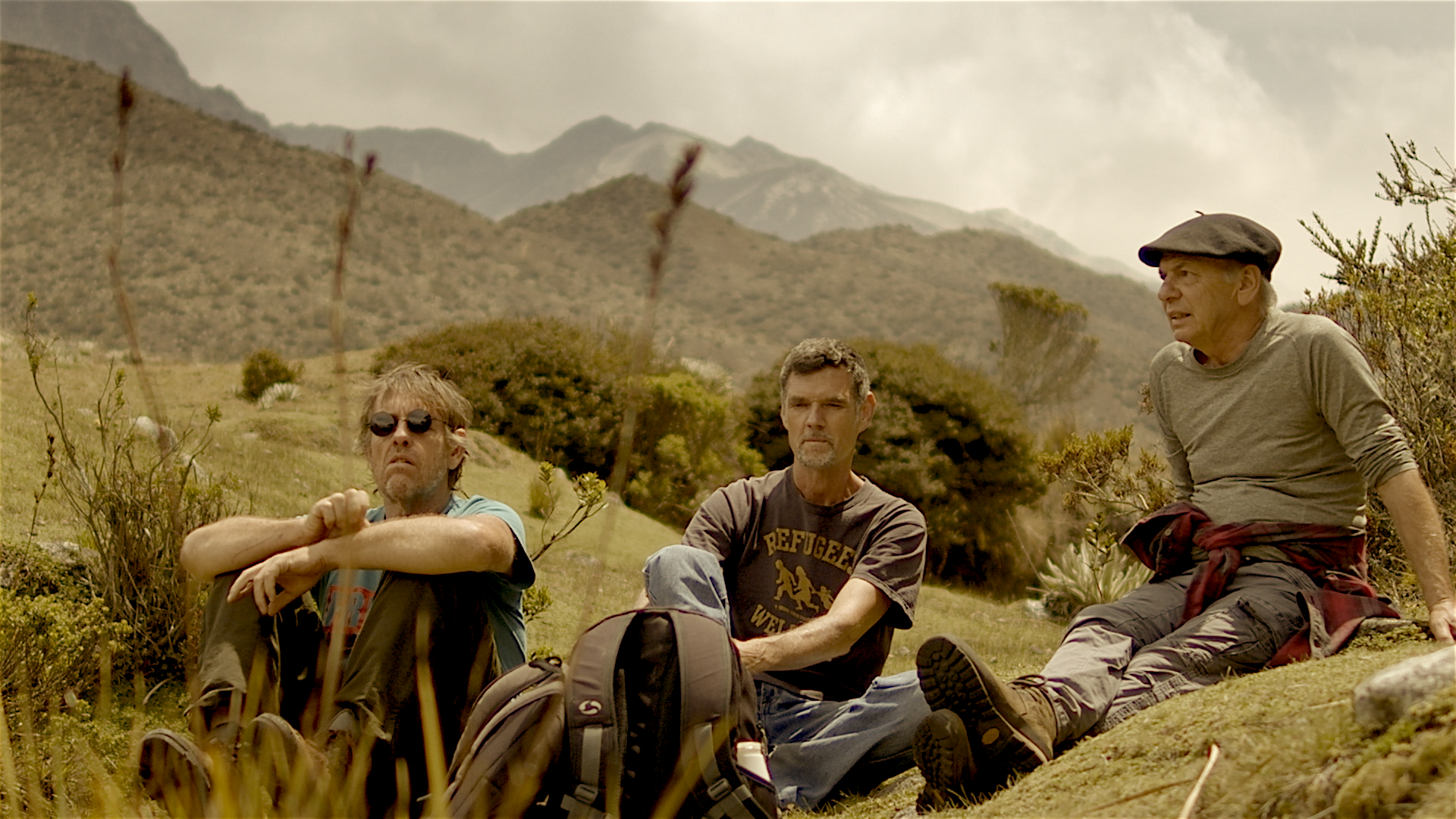
Submitted anonymously.
On December 2, 2021, the Venezuelan refugee commission finally approved the refugee claim of the two surviving implicated participants in the “K.O.M.I.T.E.E.” case, Peter Krauth and Thomas Walter. With this status, they can stay in Venezuela indefinitely with official identification documents and, after years of insecurity and the perennial threat of arrest, can finally live an almost normal life. For the third defendant, Bernd Heidbreder, this decision came too late. He died of a tumor in Merida, Venezuela in May of 2021.
The three had been in hiding and exile since a failed attack by the autonomist group “Das K.O.M.I.T.E.E.” (The Committee) on April 11, 1995 intended to blow up the deportation prison being built in Berlin-Grünau.
The German Federal Public Prosecutor’s Office accused the three of involvement in the attempted attack and has pursued them worldwide with an international arrest warrant. The statute of limitations for “planning“ a “terrorist” attack in Germany is 20 years, but the Prosecutor’s Office is seeking the K.O.M.I.T.E.E. because of a “conspiracy“ to commit an explosive attack. Although the attack did not even take place, the statute of limitations for this charge is 40 years, i.e. until 2035.
’80s and ’90s: The Autonomous Movement and the emergence of the group Das K.O.M.I.T.E.E.
During the 1980s and 1990s there was a profusion of extra-parliamentary political and social movements in Germany: the anti-nuclear and anti-war movement and the campaign against NATO, autonomous feminist struggles, squatted houses, anti-racist and anti-fascist mobilizations, as well as internationalist groups in solidarity with the liberation struggles in El Salvador, the revolution in Nicaragua, the struggles in South Africa (Azania), Palestine, Euskal Herria and later Kurdistan, and the anti-prison and anti-repression movements.
This environment and these conditions fostered Germany’s Autonomous Movement, with its rejection of the State, capital, patriarchy and any form of domination and its defense of militancy. While groups practicing varieties of Autonomism are still active in many parts of the world, German Autonomism had a heyday in the ’80s and early ’90s. During this time, hundreds of collective cooperatives emerged that wanted to develop a solidarity economy as an alternative to capitalist socialization. West Berlin became a testing ground for different models of life, a tangible utopia.
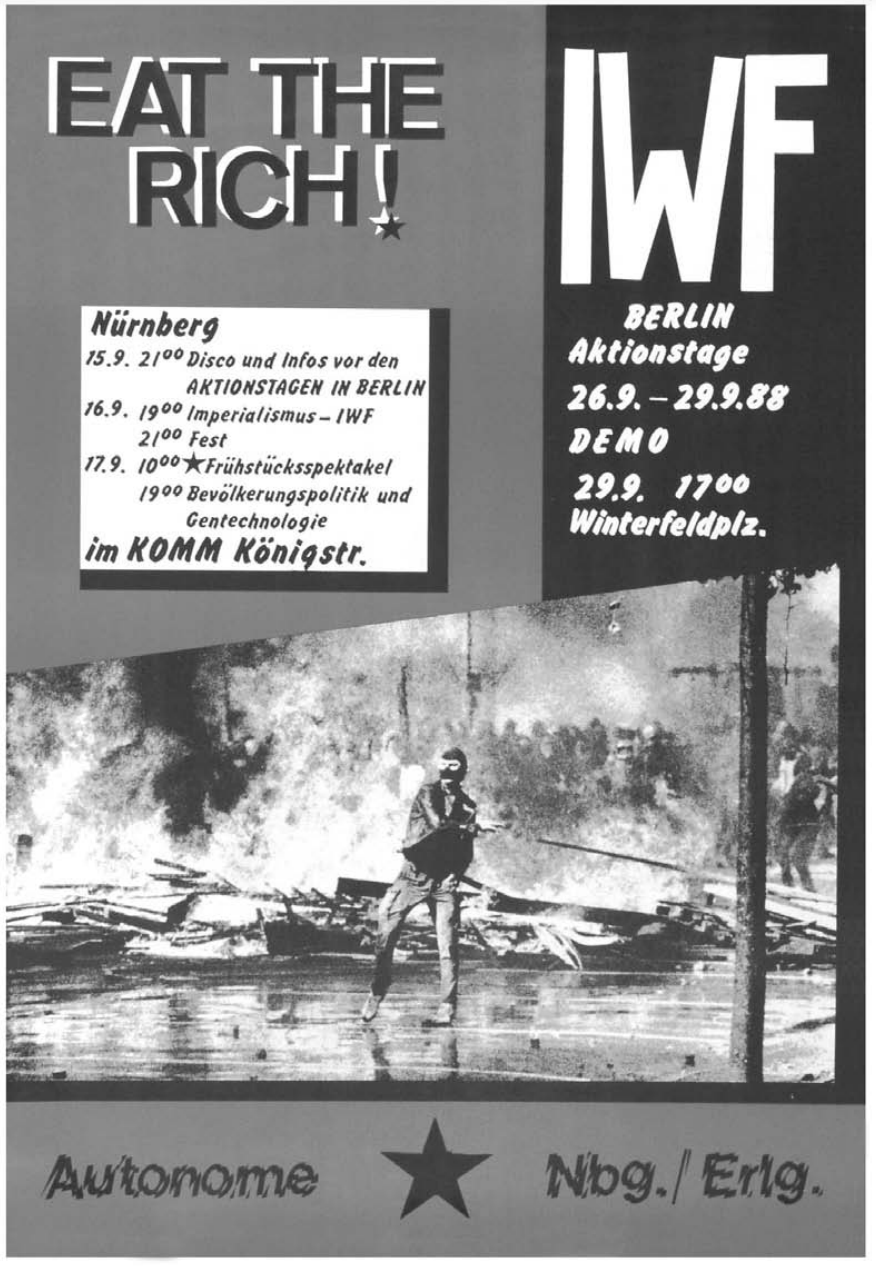
Autonomist poster against the 1988 IMF meeting in Berlin
It is in this scenario of political and social upheaval that we find the three exiled companions. After the Berlin Wall came down in 1989 there was a resurgence of the squatting movement, especially in East Berlin, and as well as a fierce reaction from the state. On November 14, 1990, three thousand police with helicopters, armored vehicles, SEK (GEOS) units, water cannons and heavy eviction equipment finally managed to evict 12 occupied buildings after hours of violent clashes with squatters and their supporters, who defended themselves with stones and Molotov cocktails. Police used tear gas, stun grenades and even live ammunition. A ricochet from a fired police bullet hit one person in the foot. 417 people were arrested.
The unified Germany generated an ugly new nationalism, an aggressive racism, and a resurgence of active Neo-Nazis on the streets. Neo-Nazi attacks on migrants, people of color and people on the left– such as anarchists and members of the autonomous scene– became the norm.
In September 1991 and at the end of August 1992 in the cities of Hoyerswerda and Rostock respectively, racist pogroms occurred, beginning with attacks by groups of Neo-Nazi youths on Vietnamese migrants, and culminating in the burning of refugee residences in those localities. These pogroms continued for several days to the applause and cheers of the population and police at the action, and were reminiscent of the Nazi Germany pogroms of the 1930s. There were at least 214 deaths from right-wing, racist, fascist violence since 1990.
The three exiled comrades were involved in many of the mobilizations against racism and fascism at the beginning of the ’90s. At the same time, the government basically abolished the right of asylum in 1993 and intensified the deportation of refugees while maintaining friendly contact and cooperation with dictatorial and authoritarian regimes, eventually preparing for Germany’s first military war mission since World War II, in former Yugoslavia.
At the end of October 1994, the group “Das K.O.M.I.T.E.E.” (a militant group of the Autonomous Movement in Berlin) made its first appearance. The first action of this group was to set fire to a building of the German Army’s Regional Defense Command Number 852 in Bad Freienwalde, in the Federal State of Brandenburg. In its statement, the group explained that they were attacking the German Armed Forces’ facilities because of their massive support for Turkey’s war against the PKK and against the Kurdish population.
“Germany is directly involved in the war against Kurdistan,” the group titled its communiqué, in which it also pointed out that arms exports to Turkey between 1964 and 1994 amounted to 6.4 billion marks, to which were added free weapons such as 300 infantry fighting vehicles, 5,000 bazookas or 300,000 Kalashnikovs as gifts from the stocks of the now disbanded Army of the German Democratic Republic.
A year later the second action of the group took place. On April 11, 1995, the deportation prison under construction in Berlin-Grünau was to be blown up. The attack failed because it was spotted by a police patrol shortly before it could be carried out.
In response, K.O.M.M.I.T.E.E. issued a statement. The group’s statement read:
“Large-scale deportations must be meticulously organized. For this, sufficient facilities are needed in the detention centers, as very few people leave voluntarily. In Berlin, the former GDR women’s prison in Grünau is being remodeled for this purpose. With up to 400 beds, the capacity for people detained for subsequent deportation will be doubled (…) Our aim is to prevent asylum seekers from being imprisoned and thus to make the right of residence possible for all asylum seekers. The demolition of the Grünau prison is our contribution to this goal. The success of this action would have been much more than a symbol. It would have meant a de facto intervention in the enforcement of deportation orders, halting the advance of the machinery, at least temporarily.” (Excerpt from the self-dissolution communiqué of the Das K.O.M.I.T.E.E. group “Knapp daneben ist auch vorbei” of September 6, 1995).
According to their own statements, police found the following things inside seized vehicles: four homemade bombs with a total of 120 kilos of explosives ready for use, warning notices in which the “K.O.M.M.I.T.E.E.” announced the imminent detonation, personal identity papers, and license plates. As a result of the documents found in the vehicles, Bernd Heidbreder, Thomas Walter and Peter Krauth had to escape, and have been living in exile ever since.
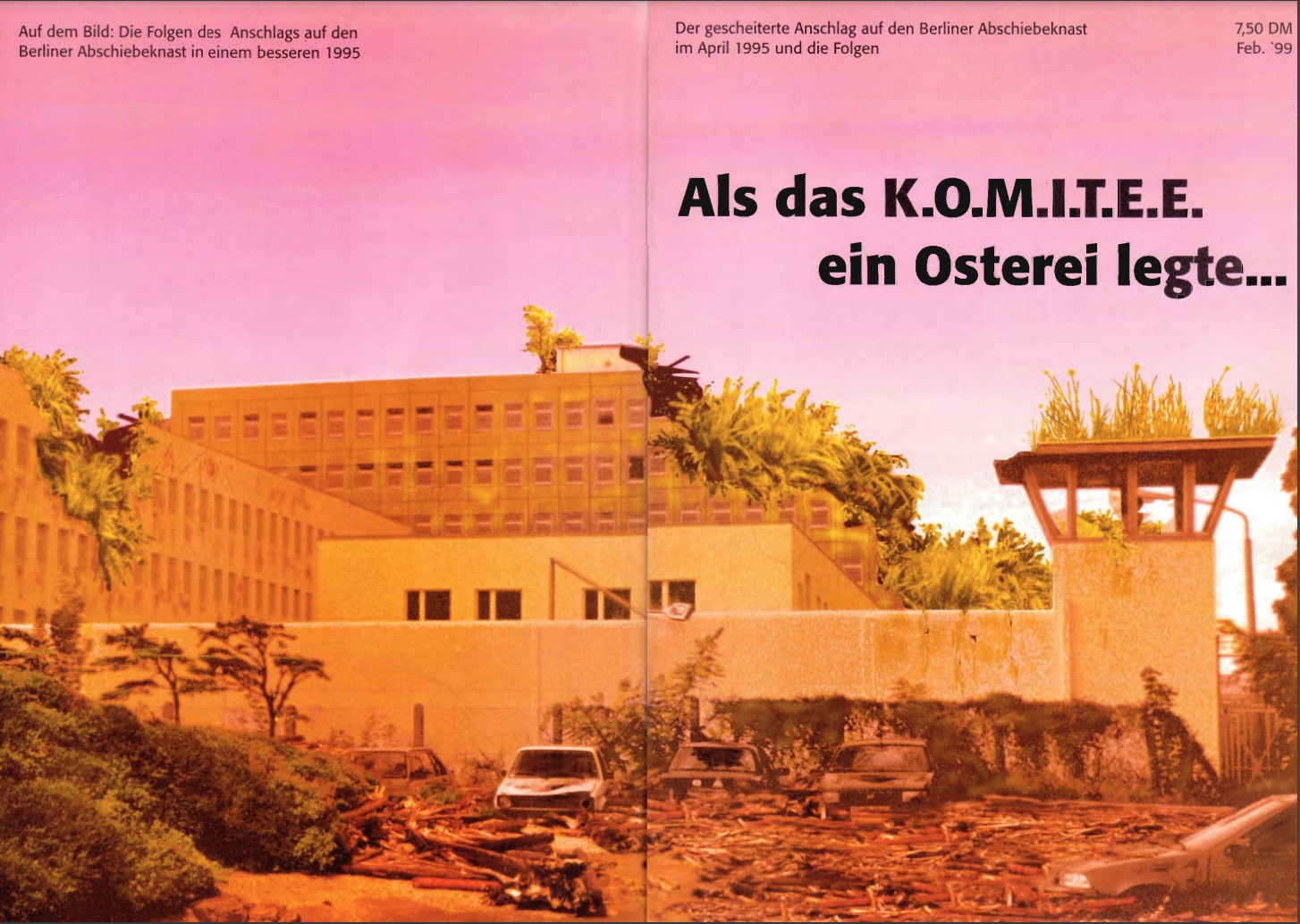
“When the K.O.M.I.T.E.E. Laid an Easter Egg” — cover of a 1999 zine about the case and its ramifications
Life far from home
Thanks to an extensive support network, the three companions managed to get away, which eventually led them to South America. Throughout this time, they managed to maintain permanent contact with some of their companions thanks to a special communication system. When necessary, and thanks to the solidarity of many people, they received financial support. Otherwise, they managed to build a new life under a false identity and continued their political activism as much as possible.
A few years ago, the three of them settled in Venezuela, attracted by the Bolivarian Revolution. They do not live together, but are neighbors and see each other regularly. In an interview, Thomas Walter describes the experience of flight and exile thus:
“(…) our flight was, after all, the story of three friends; and although we evolved differently over the years, it was decades in which we stuck together despite the difficulties. So if someone were to ask me “What have you achieved in your life?”, I would tell them that I have not let the police lock me up, that is the achievement of my life, to remain free despite this seemingly overpowering machinery that pursues us. I’m proud of it, and I didn’t do it alone, the three of us did it together. And of the three of us, one is gone, and that leaves a void in my own life as well.” (“Analysis and Criticism” June 15, 2021).
2014
In July 2014, Bernd Heidbreder was tracked down in Venezuela by a special search commando team of the German Federal Criminal Police Office and subsequently arrested. The extradition request submitted by the German prosecutor’s office was rejected in October 2015 by a ruling of the Venezuelan Supreme Court. According to the Venezuelan judiciary, the statute of limitations had long since expired for the acts of which he was accused. However, Bernd was still in prison nine months after the verdict; incomprehensibly, he spent two years behind bars in the country of “21st century socialism.” This was evidence of the problematic evolution of a state system that had become increasingly stagnant. After his arrest, he had a lot of support from some Venezuelan comrades and anarchists, but the response from the revolutionary party in Mérida, to which he was strongly committed, was disappointing. Upon his release from prison in 2016, he formally requested political asylum, which he never received. Bernd Heidbreder was stripped of his German nationality for possession of false documents. Since he could not receive a Venezuelan passport either, he became stateless.
2017
Peter Krauth and Thomas Walter also applied for refugee status in Venezuela in March 2017. The only “official” documentation they possessed was a letter explaining their situation. They were denied many rights, such as a driver’s license, opening a bank account, officially conducting business or being able to sign a work contract, a cell phone contract, etc. Although they could not be deported to Germany, they found themselves in a unclear situation without full citizenship rights.
2019
Notwithstanding all of the above, on November 16, 2019, Peter Krauth was arrested at the El Vigía airport and transferred to Caracas, where he remained in custody, pending extradition, at an Interpol office. This arrest lasted four months. Once again, as in Bernd’s 2014-2015 case, the Venezuelan Supreme Court denied extradition to Germany despite the Interpol arrest warrant. Peter described his detention situation at the Interpol office in a letter dated mid-December 2019:
“The cells are more of a temporary solution than a jail. Eleven detainees are sitting here in 20 square meters, no windows, only air conditioning. We have ten minutes to go to the bathroom in the morning and 15 minutes in the afternoon, one or two days without water a week (explanation: there are no cisterns in the bathrooms), the cell is a camp of single mattresses, the only furniture is a microwave to heat the food. And there are only 25 minutes of visits per week”.
2021
Finally, in February 2021, Interpol’s Commission for the Control of Files (CCF) upheld the appeal of lawyer Benjamin Derin and withdrew the “red notice” (high danger) from the file of Thomas Walter, one of the three wanted persons. The reason given was the ongoing asylum proceedings in Venezuela. This did not cancel the arrest warrant issued by the Federal High Court, but the possibility of search and seizure outside Europe ceased for the time being. It was due to this same “red notice” that Peter was held for four months in inhumane conditions at the Interpol office.
The withdrawal of the red notice is an unusual achievement. Normally, Interpol accepts all wanted persons from a member state without being asked to do so, which often turns red notices into an instrument of political persecution. With this decision, the CCF recognized that the international persecution against the three defendants has been illegal for years.
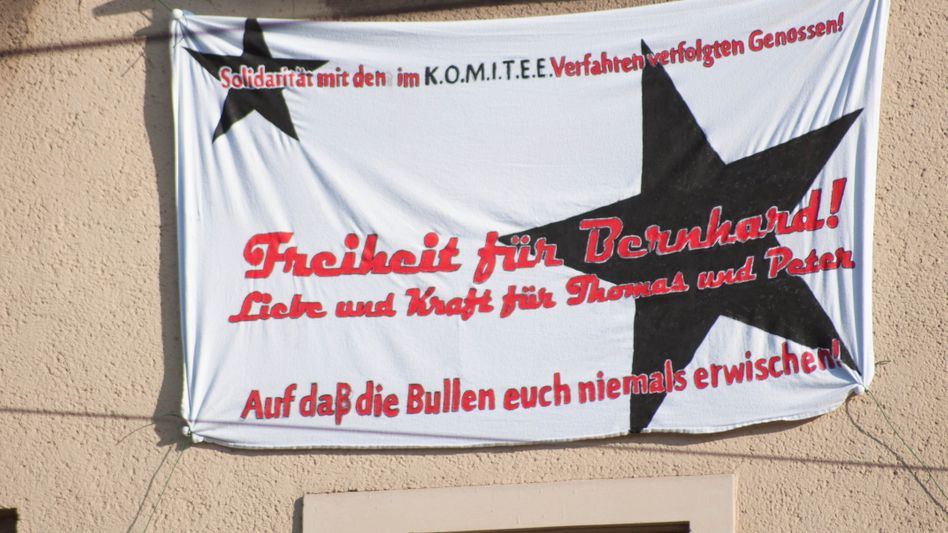
“Freedom for Bernd / Love and Power to Thomas and Peter” — a 2014 solidarity banner
Solidarity from Germany
Following the arrest of Bernd Heidbreder in 2014, a solidarity group was founded in Berlin to organize the campaign for the freedom of the three comrades in exile. On its website “Ende! aus! Basta! Aufhebung der Haftbefehle im Komitee Verfahren,” you can read current press releases of the campaign, various press articles, as well as background information on K.O.M.I.T.E.E..
At the Leipzig Documentary Film Festival in October 2019, the music and documentary film “Against the Tide – Underground in Venezuela” with musician Mal Élevé and one of the exiles, Thomas Walter, was screened for the first time. The film describes everyday life in Venezuela as well as reflections and experiences of the underground and life in exile. It’s available on DVD in several languages such as Catalan, Spanish and French.
In 2020, the campaign Exit – Bring the Boys Back Home was launched with the website bringtheboysbackhome.org/. Due to the disproportionate nature of the prosecution and the decades of repressive persecution, it advocates the cessation of the investigation and the cancellation of the arrest warrants against the three (now only two). To this end, a petition was initiated, which has since been signed by a number of artists and personalities. The campaign also serves to raise public awareness of the case, as well as to focus on the thematic areas of exile, flight, fugitives, etc.
On political exile
In recent years in Germany, the recognition and legitimacy of political exile during the period of fascism has increased. Recently, the prestigious German Historical Museum dedicated a major exhibition to the theme of exile under the title “Report from Exile – Photographs by Fred Stein.”
Fred Stein, photographer, Jew and socialist, fled Germany for exile in Paris in October 1933. In the following years he photographed dozens of exiles who, like him, had left Germany. Among them were the photographer Gerda Taro, who died fighting fascism in the Spanish Civil War in 1937, the writer Bertolt Brecht, the philosopher Hanna Arendt and the writer Alfred Kantorowic.
While exile during that period is considered legitimate in Germany and is given space in public discourse, those who are forced to flee for political reasons today are branded as terrorists and public debate hardly takes place. It is taboo, even though the political goals of the exiles then and today are not so different: for a better world, against fascism and for international solidarity.
Bernd (right) and Thomas
On May 27, 2021 Bernd Heidbreder died of cancer in Venezuela after 26 years of exile.
Thomas Walter, who accompanied him to the end, wrote after his death:
“For 26 years, the German state persecuted Bernd all over the world for having intended to prevent the construction of a prison for migrants. Bernd felt that it was not acceptable for a government, let alone the German government with its record of racist genocide, to imprison human beings for merely seeking asylum. And for Bernd, a person of profound ethical sense, it is necessary to move from idea to action. Although the sabotage against the construction of that prison, scrupulously planned to cause only material damage and under no circumstances endanger human lives, was never carried out, the German state security forces never relented in their eagerness to punish unsuccessful idealists, while at the same time turning a blind eye to the multiple murders of migrants by neo-Nazi groups.
Bernd, (…) has remained faithful to his ideal of seeking a more just, more humane society. He never wanted to be part of the voracious consumerist system that today defines itself as the only viable one, while it destroys the very foundations that allow our existence”.
Standing with Refugees
Now, at at last, the two remaining exiles have been granted political asylum in Venezuela. In a published statement they declare:
“CONARE [the Venezuelan refugee commission] took a long time to reach its decision. The law gave it a three-month deadline, but it took five years. Even if you are not an enthusiastic supporter of the Venezuelan government, this decision deserves respect. In an international context where the application of the law by NATO members outside their own territory is increasingly intensified, the decision to protect us from the political persecution of one of the richest countries in the world is a courageous one. As far as we know, we are currently the only left-wing activists in the world to receive refuge from persecution by the German state.
If you like, it can be seen as a matter of historical justice that precisely we, who in the 1990s fought in Germany for the right of asylum for refugees from the “third world”, are now benefiting in the “third world” from this same right. We appreciate it. And as those affected, who for decades have known the vulnerability and lack of rights that the Sans Papiers (Undocumented) of the world experience on a daily basis, we want to use the information about the achievement of our own security to make a passionate appeal to those who have the privilege of living within the security of Europe: Support those who are fleeing from a tyrannical government of any political persuasion, from persecution for being different or simply because they can no longer tolerate a situation in their home country and are seeking protection! Never forget that European welfare was largely built on the misery of other parts of the world. Protect the weak, defend the right of refugees to stay!” (Peter und Thomas, Merida on January 26, 2022)
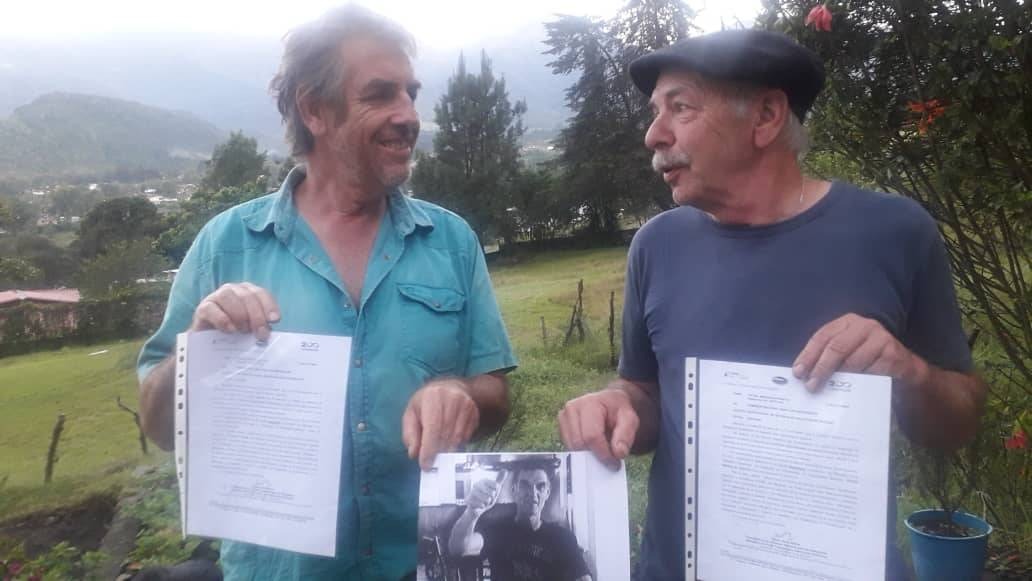
Thomas (left) and Peter with their papers and a photo of Bernd
Thursday, February 3rd at 6pm PST in Oakland, California (USA) the Tamarack Free Library will hold a film screening of “Against the tide – Underground in Venezuela” followed by a Q & A with Thomas Walter. More information is on Instagram.
Further Reading:
- History of the German Autonomous Movement
- German solidarity site about the case
- Thomas Walter’s Website
- Bring the Boys Back Home





